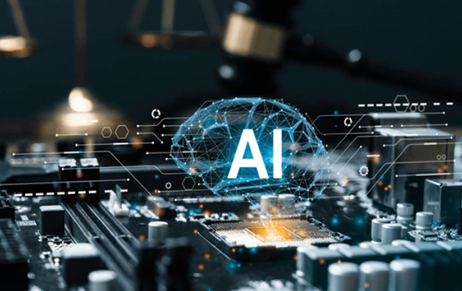In recent years, the world witnessed an exponential surge in the use of Artificial Intelligence…
Biometric Intellectual Property in the Automated Cognitive Era
“Biometric, a cornerstone of innovation driving unprecedented advancements in the age of automation and their fusion is the key to unlocking a secure and seamless future”.
In today’s digital dynamic world of gadgets and round-the-clock internet access, the culture of passwords and other data identification methods are drastically replaced by biometric data. With the advancement of the technological landscape, mobile devices and other gadgets are rapidly using fingerprints, iris scans, facial recognition, and voice as a key to unlock the devices. Undoubtedly, biometric-based Cognitive intelligence has become more pervasive but intellectual property is also potentially developed to be concerned with data privacy laws and regulations. In this era of the AI realm, biometric data is frequently used and easing ignorance of the worldwide collection of biometric data. The global market biometric data collection is approximately $35 Billion and it is estimated to be $80 Billion before completion of the decade. As per the US (DHS), they have collected the biometric data of 80 percent of US citizens. Biometric data is now a part of human’s everyday cycle and has slipped from Apple Siri to grocery stores and added as a daily ritual.
[Image Sources: Shutterstock]

The intersecting landscape of biometrics and intellectual property in the artificial intelligence era has opened new frontiers of innovation but has also exposed us to noteworthy privacy challenges. The wide prevalence of biometric data is helping us to improve convenience and authenticity in a fast fast-paced world by replacing traditional methods of entering PINs and passwords. It personalizes the user experience through facial recognition and also improves accuracy. It may used to identify the disguised individuals and detect spoofing attempts. On the other hand, these substantial factors are proven as significant concerns and their mishandling can be turn devastating. It may raise complex implications like threats to privacy and security as biometric data is kinda highly sensitive information so it becomes crucial to protect. The potential deepfakes and misinformation are fatal to the growing society by enabling them to create highly realistic videos and pictures of misconduct they never did. Biometric data can severely infringe privacy rights by unsanctioned surveillance and tracking individuals’ movements without their consent.
Biometric Data can be treated as Trade Secrets?
Treating biometric data as trade secrets is a complex legal issue having stark arguments to be made on both sides of the question. Some legal scholars suggest treating biometric data as trade secrets by using its legal framework of intellectual property. Its acceptance as a trade secret may address the collection of data and provide a private right of action for damages in addition to state legislation.
Biometric data is valuable because of the uniqueness of each individual and cannot be replicated easily. It can be kept secret if it is processed & stored securely but also highly personal and sensitive to grant to be treated like trade secrets. Biometric data is also not always secret as individual pictures are often publicly available on social media.
Trade secrets are not highly protected and cannot be accessed easily, their unauthorized use can bring penalties and likewise, biometric data should be also highly restricted. Trade secrets are safeguarded indefinitely and have no expiration date but what about the biometric data after the individual’s death?
Despite some of the advantages of the innovative approach of treating biometric data as trade secrets (IP) some IP experts have shown their concern about this decision whether or not to treat biometric data as trade secret. Is it ill-suited or what cannot be answered in a one-size-fits-all answer?
Current legal panorama in foreign and India
As biometric data as a trade secret is evolving and complex, often the technological frontiers outpace the existing regulatory landscape, and the field of biometric data is undeniable. Some states like Texas, Illinois & Washington of USA have passed legislation for small entities collecting biometric data. These legislations provide the right of action and address damages. Still, there are no authentic and universal regulations to treat biometric data as a trade secret or to address the damages.
In India, the Personal Data Protection Act, of 2023 protects biometric data because it’s classified as personal and covered under informational privacy theory due to risks of pilferage, data theft, and leaks. The law of equity also safeguards against inappropriate disclosure of private information but there is no specific statute related to trade secrets per se.
Barriers to enforcing Biometric as Intellectual Property
Enforcing biometric data as a trade secret brings several challenges and risks. Traditional intellectual secrets like trade secrets and formulas or algorithms were easy to hide but biometric data are often observable and can be replicated. Biometric intellectual property can be easily reconstructed through stolen samples or publicly available data or biometric templates which weakens the protection like trade secrets. The current, legal landscape is also evolving, application of state laws of foreign is also Grey. Biometric data has inherent privacy concerns and cannot be compromised.
Biometric technology is constantly evolving and it is yet to grow old which makes it difficult to treat biometrics data as Biometric Intellectual Property. It is difficult to maintain it like trade secrets, which may be rendered obsolete by newer technologies which may commercially degrade its value. At the outset, it is important to balance innovation with privacy. In the era of automated cognition, we must ensure equity, individual interest, and respect for their privacy.
Author: Prity Kumari Suman, in case of any queries please contact/write back to us via email to chhavi@khuranaandkhurana.com or at IIPRD.



